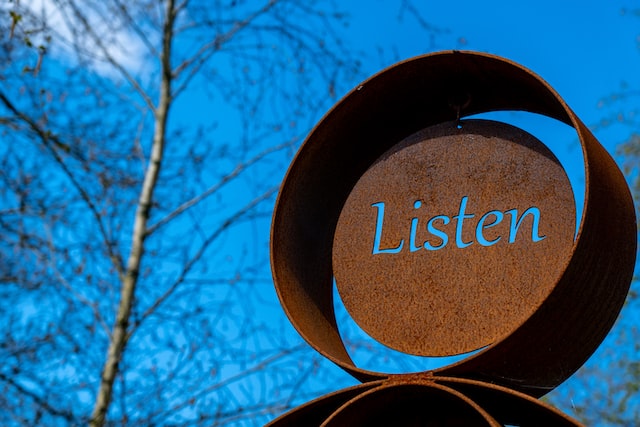How good of a listener are you?
If you’re like us, you probably rank yourself above average. Unfortunately, studies indicate that our ability to evaluate our listening skills is about as good as our ability to rate ourselves as drivers. Consider that 73% of American drivers consider themselves better than average drivers, but our experiences on the road tell us otherwise, and we bet yours do too!
A study at Wright State University surveyed more than 8,000 people, and almost all rated themselves as listening as well as, or better than, their co-workers. When we read something like this, we intuitively draw a conclusion – most people have an inflated view of their listening skills, but we’re not one of them, right?
For the moment, we invite you to question your confidence in your listening skills and practice some strategies that can help you move from thinking you’re a great listener to being a great listener.
- Focus. Do you ever find yourself nodding to a conversation only to realize you have no idea what the other person said? You’re not alone. Our minds can be like a monkey swinging across branches in the forest – we move from thought to thought, and it takes a conscious effort to rein our minds in and listen deeply to the person in front of us. Next time you’re in a conversation, take a deep breath and remind yourself to be fully present at the moment.
- Zip It. Have you ever been in a conversation where someone seems more interested in their thoughts than what you’re saying? It’s frustrating, right? Well, it turns out that we’re all guilty of this at times. It’s tempting to plan our response or offer solutions, but doing so can undermine the value of the conversation. By jumping in too quickly, we risk cutting off the other person’s train of thought and missing the underlying message. It’s like saying, “I’ve heard enough; let me tell you what to do.” And let’s face it, no one likes to feel like they’re being talked at instead of listened to. Next time you’re in a discussion, resist the urge to speak unless you have a question or need clarification.
- Put Away Your Phone. Imagine sitting down with a friend for a heart-to-heart chat, and as you start pouring out your thoughts, you notice their eyes drift to their phone. How would that make you feel? Not great, right? That’s because giving someone your undivided attention is crucial to active listening. When you’re in a conversation, your phone can be a major distraction that takes away from the moment. By fully committing to the discussion and putting away your phone, you create a space where both parties feel heard and valued. Next time you’re in a one-on-one, ditch the phone and immerse yourself in the conversation.
- Judge Not. Have you ever worked with someone who wasn’t open to hearing your point of view or always thought they were right? Probably not your all-time favorite co-worker, huh? Having an open mind is an essential listening skill. Being open-minded makes you approachable and intriguing to others, and it’s a key component of creating meaningful connections. In the professional world, an open mind can be the key to unlocking new ideas and opportunities, while a closed mind can hinder growth and progress. Next time you’re in a dialogue, suspend judgment and cultivate open-mindedness by asking questions that support your ability to step into the other person’s shoes, especially if you don’t agree with their beliefs or actions.
- Use Body Language. Have you ever noticed how some people effortlessly attract others? Did you wonder how they do it? How you use your body, tone of voice, and facial expressions can all significantly impact how others perceive you. Great listeners know this and use positive body language to make themselves more approachable and engaging. By adopting an enthusiastic tone, maintaining eye contact, and keeping an open posture, you send the message that you’re fully present and interested in what the other person has to say. Next time you’re in a chat, pay attention to your body language and try to project positivity and openness.
From Reflection to Action: Which of these strategies could make you a better listener? Practice that strategy for 2 weeks and see if it makes a difference in how you feel about conversations and how people respond to you.


















